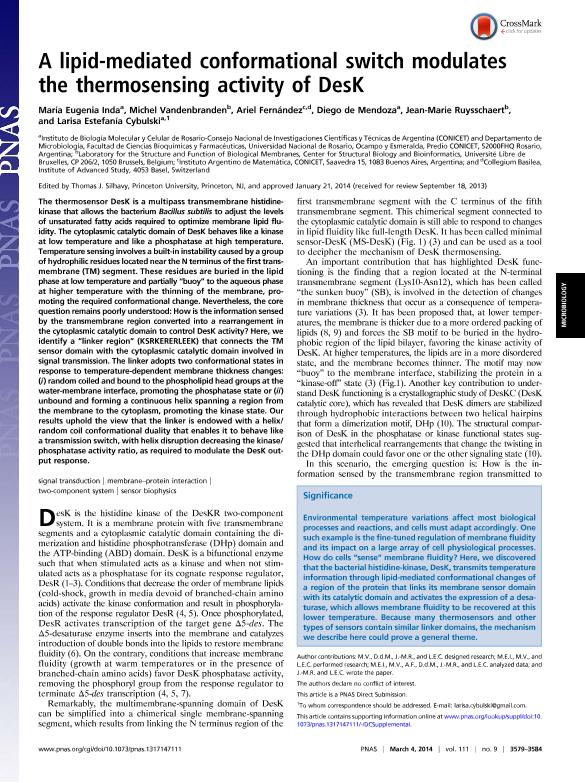Artículo
A lipid-mediated conformational switch modulates the thermosensing activity of DesK
Inda, María Eugenia ; Vandenbranden, Michel; Fernandez, Ariel
; Vandenbranden, Michel; Fernandez, Ariel ; de Mendoza, Diego
; de Mendoza, Diego ; Ruysschaert, Jean Marie; Cybulski, Larisa Estefania
; Ruysschaert, Jean Marie; Cybulski, Larisa Estefania
 ; Vandenbranden, Michel; Fernandez, Ariel
; Vandenbranden, Michel; Fernandez, Ariel ; de Mendoza, Diego
; de Mendoza, Diego ; Ruysschaert, Jean Marie; Cybulski, Larisa Estefania
; Ruysschaert, Jean Marie; Cybulski, Larisa Estefania
Fecha de publicación:
02/2014
Editorial:
National Academy Of Sciences
Revista:
Proceedings Of The National Academy Of Sciences Of The United States Of America
ISSN:
0027-8424
Idioma:
Inglés
Tipo de recurso:
Artículo publicado
Clasificación temática:
Resumen
The thermosensor DesK is a multipass transmembrane histidine-kinase that allows the bacterium Bacillus subtilis to adjust the levels of unsaturated fatty acids required to optimize membrane lipid fluidity. The cytoplasmic catalytic domain of DesK behaves like a kinase at low temperature and like a phosphatase at high temperature. Temperature sensing involves a built-in instability caused by a group of hydrophilic residues located near the N terminus of the first transmembrane (TM) segment. These residues are buried in the lipid phase at low temperature and partially “buoy” to the aqueous phase at higher temperature with the thinning of the membrane, promoting the required conformational change. Nevertheless, the core question remains poorly understood: How is the information sensed by the transmembrane region converted into a rearrangement in the cytoplasmic catalytic domain to control DesK activity? Here, we identify a “linker region” (KSRKERERLEEK) that connects the TM sensor domain with the cytoplasmic catalytic domain involved in signal transmission. The linker adopts two conformational states in response to temperature-dependent membrane thickness changes: (i) random coiled and bound to the phospholipid head groups at the water-membrane interface, promoting the phosphatase state or (ii) unbound and forming a continuous helix spanning a region from the membrane to the cytoplasm, promoting the kinase state. Our results uphold the view that the linker is endowed with a helix/random coil conformational duality that enables it to behave like a transmission switch, with helix disruption decreasing the kinase/phosphatase activity ratio, as required to modulate the DesK output response.
Palabras clave:
Signal Transduction
,
Transmembrane Sensor
,
Conformational Switch
,
Kinase
Archivos asociados
Licencia
Identificadores
Colecciones
Articulos(IAM)
Articulos de INST.ARG.DE MATEMATICAS "ALBERTO CALDERON"
Articulos de INST.ARG.DE MATEMATICAS "ALBERTO CALDERON"
Articulos(IBR)
Articulos de INST.DE BIOLOGIA MOLECULAR Y CELULAR DE ROSARIO
Articulos de INST.DE BIOLOGIA MOLECULAR Y CELULAR DE ROSARIO
Citación
Inda, María Eugenia; Vandenbranden, Michel; Fernandez, Ariel; de Mendoza, Diego; Ruysschaert, Jean Marie; et al.; A lipid-mediated conformational switch modulates the thermosensing activity of DesK; National Academy Of Sciences; Proceedings Of The National Academy Of Sciences Of The United States Of America; 111; 9; 2-2014; 3579-3584
Compartir
Altmétricas



